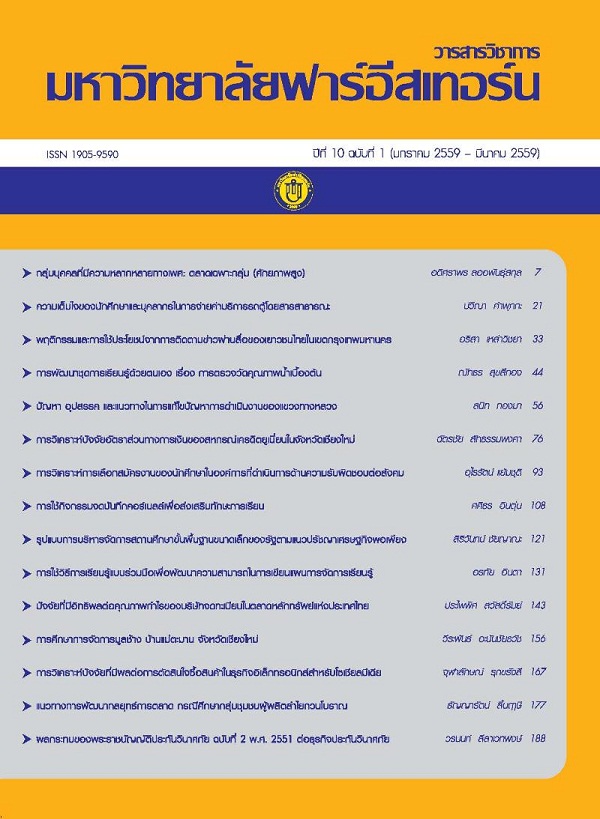การวิเคราะห์การเลือกสมัครงานของนักศึกษา ในองค์การที่ดำเนินการด้านความรับผิดชอบต่อสังคม
Main Article Content
Abstract
งานวิจัยนี้เชิงสำรวจนี้มีวัตถุประสงค์เพื่อวิเคราะห์การเลือกสมัครงานของนักศึกษาจากสถาบันในกลุ่มเบญจมิตรในองค์การธุรกิจที่มีกิจกรรมเกี่ยวกับความรับผิดชอบต่อสังคม ใช้การสุ่มตัวอย่างแบบเฉพาะเจาะจงจากนักศึกษาชั้นปีที่ 4 ระดับปริญญาตรีและนักศึกษาระดับปริญญาโทจำนวน 594 คนเพื่อให้ได้กลุ่มตัวอย่างที่เป็นตัวแทนที่ดีของประชากร เก็บรวบรวมข้อมูลโดยใช้แบบสอบถาม วิเคราะห์ข้อมูลด้วยวิธีการทางสถิติโดยใช้การวิเคราะห์ตารางไขว้ (crosstabs) และการวิเคราะห์ความแปรปรวนจำแนกทางเดียว (one way ANOVA) ข้อค้นพบที่ได้คือ เมื่อพิจารณาแยกตามเพศพบว่า นักศึกษาชายและหญิงส่วนใหญ่เลือกสมัครเข้าร่วมงานกับองค์การที่มีระดับความรับผิดชอบต่อสังคมในระดับสูงที่สุดคือ ระดับที่ 4 การวิเคราะห์ความแปรปรวนแสดงว่า การเลือกสมัครงานในองค์การธุรกิจที่มีการดำเนินการด้านความรับผิดชอบต่อสังคมของนักศึกษาชายแตกต่างจากนักศึกษาหญิงอย่างมีนัยสำคัญ ในขณะที่นักศึกษาสาขาวิศวกรรมศาสตร์และวิทยาศาสตร์และเทคโนโลยีเลือกสมัครงานในองค์การธุรกิจที่มีการดำเนินการด้านความรับผิดชอบต่อสังคมแตกต่างจากนักศึกษาสาขาบริหารธุรกิจและบัญชี
This survey research has the objective to analyze job applications of students from the Benjamit private university association in business corporates that participate in socially responsible activities. Purposive sampling was used to select 594 samples from Senior students and Graduate students to represent job seekers. The research used questionnaire for collecting data and analyzed its data by crosstabs and one way ANOVA. The findings are: (1) the majority of both male and female students choose to apply for jobs in business organizations demonstrating highest level of corporate social responsibility (4th Level); and (2) Results from one way ANOVA and multiple comparison test show significant difference between male and female job seekers; and there is also a significant difference in job applications between Engineering / Science & Technology students and Business Administration and Accountancy students.
Article Details
1. Any views and comments in the Journal of Social Innovation and Lifelong Learning are the authors’ views. The editorial staff have not to agree with those views and it is not considered as the editorial’s responsibility.
2. The responsibility of content and draft check of each article belongs to each author. In case, there is any lawsuit about copyright infringement. It is considered as the authors’ sole responsibility.
3. The article copyright belonging to the authors and The Far Eastern University are copyrighted legally. Republication must be received direct permission from the authors and The Far Eastern University in written form.
References
Appel, L. (2014). CSR as a factor in the war for talents. Master of Science in Business Administration, Human Resource Management, University of Twente, Netherlands.
Bauman, C. W. & Skitka L. J. (2012). Corporate social responsibility as a source of employee satisfaction. (online) retrieve from sciencedirect database
Becker-Olsen, K. L., Cudmore, B. A. & Hill, R. P. (2006). The impact of perceived corporate social responsibility on consumer behavior. Journal of Business Research. 59 (1), 46-53.
Carroll, A. B. (1999). Corporate social responsibility, Evolution of a definitional construct. Journal of Business & Society. 38 (3), 268-295.
Donaldson,T.,& Preston, L. E. (1995). The stakeholder theory of the corporation: Concepts, evidence, and implications. Academy of Management Review. 20, 65–91.
Kang, K. H., Lee, S. & Huh, C. (2010). Impacts of positive and negative corporate social responsibility activities on company performance in the hospitality industry. International Journal of Hospitality Management. 29(2010), 72–82.
Khan, M., Majid, A., Yasir, M. & Arshad, M. (2013). Corporate Social Responsibility and Corporate Reputation: A Case of Cement Industry in Pakistan. Interdisciplinary Journal of Contemporary Research in Business. May 2013, 5(1), 843-857.
Kim, H. R., Lee, M., Lee, H. T. & Kim, N. M. (2010). Corporate social responsibility and employee–company identification. Journal of Business Ethics. 95(4), 557-569.
Lea, R. (2002). Corporate Social Responsibility: IoD Member Opinion Survey. The Institute of Directors, UK. November 2002, 10.
Nan, X. & Heo, K. (2007). Consumer Responses to Corporate Social Responsibility (CSR) Initiatives: Examining the Role of Brand-Cause Fit in Cause-Related Marketing. Journal of Advertising. 36 (2, Summer 2007), 63–74.
Rowley, C., Ramasamy, B. & Yeung, M. C.H. (2013). Corporate Social Responsibility and New Job Seekers in the Greater China Region: Factors in Application Decision. Cass Business School. (online) retrieve from http://www.cassknowledge.com
Stawiski, S., Deal, J. J. & Gentry, W. (2010). Employee Perceptions of Corporate Social Responsibility: The Implications for Your Organization. Center for Creative Leadership. (online) retrieve from http://insights.ccl.org
Usunier, J.C., Furrer, O. & Furrer-Perrinjaquet, A. (2011). The perceived trade-off between corporate social and economic responsibilities: A cross-national Study. International Journal of Cross Cultural Management. 11(3), 279-302.
ชมพูนุช บุญประเสริฐ. (2556). ศึกษาความรับผิดชอบต่อสังคมและสิ่งแวดล้อมกับความผูกพันของพนักงานกลุ่ม generation Y. WMS Journal of Management. 1(2 Sep-Dec 2012), 24-36.
สุระพันธ์ สวัสดิพรรค. (2545). ทัศนคติของผู้บริโภคที่มีต่อองค์กรธุรกิจที่ใช้นโยบายการตลาดเพื่อสังคม. วิทยานิพนธ์บริหารธุรกิจมหาบัณฑิต, มหาวิทยาลัยบูรพา.

